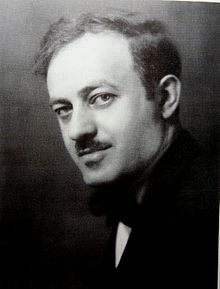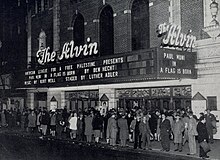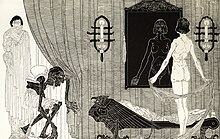Ben Hecht
After graduating from high school in 1910, Hecht ran away to Chicago, where, in his own words, he "haunted streets, whorehouses, police stations, courtrooms, theater stages, jails, saloons, slums, madhouses, fires, murders, riots, banquet halls, and bookshops.
Film author Scott Siegal wrote, "He was considered a child prodigy at age ten, seemingly on his way to a career as a concert violinist, but two years later was performing as a circus acrobat".
After concluding One Thousand and One Afternoons, Hecht went on to produce novels, plays, screenplays, and memoirs, but for him, none of these eclipsed his early success in finding the stuff of literature in city life.
Recalling that period, Hecht wrote, "I haunted streets, whorehouses, police stations, courtrooms, theater stages, jails, saloons, slums, madhouses, fires, murders, riots, banquet halls, and bookshops.
I ran everywhere in the city like a fly buzzing in the works of a clock, tasted more than any fit belly could hold, learned not to sleep, and buried myself in a tick-tock of whirling hours that still echo in me".
[9] He arrived in Los Angeles and began his career at the beginning of the sound era by writing the story for Josef von Sternberg's gangster movie Underworld in 1927.
As film historians Mast and Kawin wrote, "The newspaper reporters often seemed like gangsters who had accidentally ended up behind a typewriter rather than a tommy gun; they talked and acted as rough as the crooks their assignments forced them to cover ...
Black writes, "as Mankiewicz, Selznick, and Hecht knew all too well, much of the blame for the failure of the movies to deal more frankly and honestly with life, lay with a rigid censorship imposed on the industry ... [and] on the content of films during its golden era of studio production."
Film historian Richard Corliss wrote, "it is his crisp, frenetic, sensational prose and dialogue style that elevates his work above that of the dozens of other reporters who streamed west to cover and exploit Hollywood's biggest 'story': the talkie revolution.
in the early 1920s, Hecht organized campaigns against the Ku Klux Klan, whose lynchings of minorities, primarily blacks, terrorized the American South and North ... Artists and writers joined the effort, blending civil rights into the arts and literary scene ... Hecht wrote enough stories about black-white dynamics to form a small collection, including To Bert Williams, a richly symbolic obituary to the eminent vaudevillian, the thought-provoking The Miracle ...
Hecht film stories featuring black characters included Hallelujah, I'm a Bum, co-starring Edgar Conner as Al Jolson's sidekick in a politically savvy, rhymed dialogue over Richard Rodgers music.
[37]Hecht was among a number of signers of a formal statement, issued in July 1941, calling for the "utmost material assistance by our government to England, the Soviet Union, and China".
There can be no victory over Hitlerism abroad if democracy is destroyed at home.Later that year, he had his first large-scale musical collaboration with symphonic composer Ferde Grofe on their patriotic cantata, Uncle Sam Stands Up.
Hecht "took on a ten-year commitment to publicize the atrocities befalling his own religious minority, the Jews of Europe, and the quest for survivors to find a permanent home in the Middle East".
[37] In 1943, during the midst of the Holocaust, he predicted, in a widely published article in Reader's Digest magazine, Of these 6,000,000 Jews [of Europe], almost a third have already been massacred by Germans, Romanians, and Hungarians, and the most conservative of scorekeepers estimate that before the war ends, at least another third will have been done to death.
[42]Also in 1943, "out of frustration over American policy, and outrage at Hollywood's fear of offending its European markets", he organized and wrote a pageant, We Will Never Die, which was produced by Billy Rose and Ernst Lubitsch, with the help of composer Kurt Weill and staging by Moss Hart.
[10][47][48][49][50]Six months after the establishment of Israel, the Bergson Group was dissolved, followed by a dinner in New York City where former Irgun commander Menachem Begin appeared, saying, I believe that my people, liberated and re-assembled in its country, will contribute its full share toward the progress of all mankind ... [and predicted] that all of Palestine eventually would be free, and that peace and brotherhood would prevail among Arabs and Jews alike.
[51]Thanks to his fundraising, speeches, and jawboning, Sternlicht writes, "Ben Hecht did more to help Jewish refugees from the Holocaust, and to ensure the survival of the nascent state of Israel, than any other American Jew in the twentieth century".
[23]: 6 Hecht's introduction, which is nothing if not moody and Sandburgian, describes "A great city in the dead of night – streets lonely, moon-flooded – buildings empty as the cliff-dwellings of a forgotten age.
Every line of it glows with a demoniacal humor, sordid, insolent, and mischievous to the point of downright perversity, in which one instantly recognizes the heroic comic spirit of its authors ...
Film historian Max Wilk interviewed Leyland Hayward, an independent literary agent, who, in 1931, managed to convince Hecht that a young oil tycoon in Texas named Howard Hughes wanted him to write the screenplay to his first book.
It may seem like a short space of time for a man to do a complete new script, but Hecht is famous for his speed, and did the entire job on Scarface in eleven days.Barbary Coast was also directed by Howard Hawks and starred Miriam Hopkins and Edward G. Robinson.
The film takes place in late nineteenth century San Francisco with Hopkins playing the role of a dance-hall girl up against Robinson, who runs the town.
Hecht and Macarthur left Hollywood and went back to New York where they wrote produced and co-directed "The Scoundrel" marking the American film debut of Noël Coward.
Very anxious to get picture into laboratory at once and would appreciate it if you could tackle them immediately upon their receipt[56]: 214 "His Girl Friday remains not just the fastest-talking romantic comedy ever made, but a very tricky inquiry into love's need for a chase (or a dream) and the sharpest pointer to uncertain gender roles.
Examiner writes, Director Howard Hawks' 1940 classic "His Girl Friday" is not just one of the funniest screwball comedies ever made, it is also one of the finest film adaptations of a stage play.
"Hawks took Ben Hecht and Charles MacArthur's Broadway hit "The Front Page", the best play about newspapers ever written, and, by changing the gender of a major character, turned it into a romantic comedy.
Although the final screenplay and film was made into a comedy spoof, Hecht's version was written as a straight Bond adventure, states spy novelist Jeremy Duns, who recently discovered the original lost scripts.
According to Duns, Hecht's version included elements hard to imagine in a film adaptation, adding that "these drafts are a master-class in thriller-writing, from the man who arguably perfected the form with Notorious.
"[59] Hecht wrote that he has "never had more fun writing a movie", and felt the James Bond character was cinema's first "gentleman superman" in a long time, as opposed to Hammett and Chandler's "roughneck supermen".





Wallace Smith (illustrator)

Freeman Elliott (illustrator)
